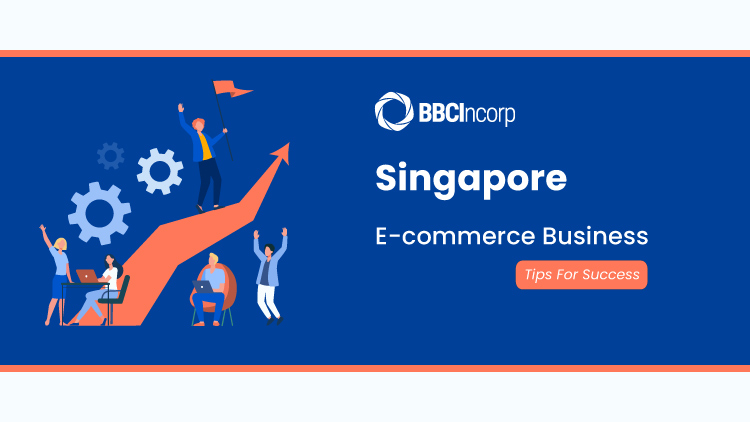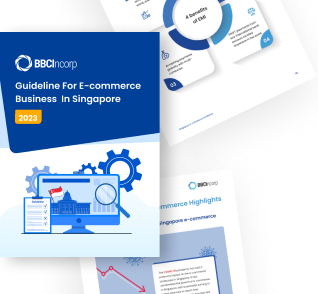
With more businesses turning to online sales in recent years to reach a broader audience, the e-commerce industry has exploded, and The Lion City has gained prominence as a hub for professional players.
If you’re considering starting an e-commerce business in Singapore, there are a few things you’ll need to take into account. What we’ll share in this article includes several helpful tips on how to successfully start your Singapore e-commerce company.
Understanding the requirements and procedures for Singapore company setup
For e-commerce startups in Singapore, there are a few key things to keep in mind to set up your business.
After you determine the proper business structure (highly recommend foreigners to register a private limited company in Singapore), decide on an eligible company name and work with a professional incorporation service provider in Singapore to legalize your company. An efficient incorporation service firm may also get your Singapore company open in just one day.
The next step is to submit to ACRA – Accounting and Corporate Regulatory Authority – your application, required docs, and the registration fee, and you’ll complete the process easily.
A major plus for foreigners is that the business registration process in Singapore is fairly straightforward and can be done online; however, make sure all the required documents are in order.
There are possibilities you might face one or many legal issues regarding the e-commerce business such as compliance, data security, and more. Stay up-to-date with the latest changes and regulations for the most favorable result.
Below are the primary documents needed for Singapore company incorporation you should bear in mind:
- A certified true copy of the passports of all company members
- A certified true copy of address proofs of all company members
- Business details such as services, sectors, and major operating countries
It’s important to point out that to launch an e-commerce business in the city-state, you will have to open an account with a corporate bank. There might be different KYC procedures for different banks in Singapore, so you should consult well before opening a bank account.
You can also find a comprehensive guide on how to launch an e-commerce business successfully in Singapore in our previous article.
Picking a good e-commerce platform and the right target market
To run your e-commerce business smoothly, you’ll need a powerful and user-friendly e-commerce platform. You will need to choose the right e-commerce platform for your website.
There are many e-commerce platforms available, and each has its strengths and weaknesses. You’ll need to evaluate your specific needs to choose the best one.
Here’s an overview of the significant strengths and improving points of each of these popular shopping platforms in Singapore:
Shopee Singapore (shopee.sg) for diverse options at reasonable prices
Pros
- Diverse products at affordable prices: Shopee showcases an extensive selection, from renowned brands to local vendors, at attractive prices. Regular discounts, flash sales, and vouchers make shopping even more budget-friendly.
- User-friendly app: Their app is easy to navigate, featuring an efficient search function by location, popularity, or category. Additionally, it offers live chat, in-app games, a live streaming section, and interactive promotional popups.
- Various payment options: Shopee supports many payment methods like Shopee Pay, credit/debit cards, and cash-on-delivery.
- Buyer protection: Shopee provides product protection and quality guarantees. Plus, you can rate the services and earn bonus credits for future purchases.
Cons
- Variable product quality: Because many sellers are third-party merchants, products from non-certified stores may be inconsistent in quality.
- Shipping delays: International shipping may take longer due to external reasons. Returning false products for a refund is also a tiring and lengthy process. Your money will eventually be refunded, but you won’t receive the product you ordered.
Carousell Singapore (carousell.sg) for preowned items
Pros
- Great for secondhand deals: Ideal platform for buying and selling pre-loved items at bargain prices.
- Negotiable prices: This site allows direct communication with sellers. This makes price negotiations much easier and adjustable.
- Local community feel: Facilitates local meetups for exchanges, which can save on shipping costs.
Cons
- No buyer protection: Transactions are mostly direct, so there’s a higher risk of scams.
- Limited on new products: Carousell is mostly known for pre-owned, used, and sometimes slightly defective items.
Amazon Singapore (amazon.sg) for speedy delivery
Pros
- Fast delivery: With Amazon Prime, customers enjoy speedy and free delivery, often within the same or the next day, making it convenient for urgent purchases.
- Wide product range: Amazon Singapore offers an extensive selection of local and international products, including options for reselling used goods or not-for-sale items.
- Exclusive deals and discounts: Frequent promotions, lightning deals, and Prime Day sales offer great savings and value for shoppers.
Cons
- Higher prices: Prices can be higher compared to other local platforms, especially for imported goods.
- Less product options: Despite a broad international range, local products or niche items might not be as widely available.
Lazada Singapore (lazada.sg) for branded authentic products
Pros
- Extensive product variety: Offers a wide range of products from electronics to fashion, including both international and local brands.
- Competitive pricing with frequent promotions: Regular flash sales, vouchers, and Lazada’s 11.11 or 12.12 mega sales provide great deals and discounts.
- LazMall for authentic products: LazMall guarantees 100% authenticity and offers a 15-day hassle-free return policy.
Cons
- Limited shipping options: Lazada runs vaf develops its own internal logistics system. This leads to limited shipping options for customers.
- Confusing website/app interface: Users complain that Lazada’s app and website are unnecessarily clunky. For example, vouchers are not attached directly to the payment step, and customers must find and apply for them outside.
Amazon Global Selling (amazon.com) for global transactions
Pros
- Access to a global marketplace: Provides a vast selection of products that may not be readily available in Singapore, along with multiple currency options.
- Reliable customer service: Benefits from Amazon’s renowned customer service and comprehensive return policies.
- Competitive pricing: Many items can be purchased at lower prices compared to local retail options.
Cons
- Higher shipping costs: International shipping fees can be quite steep, impacting overall affordability.
- Longer delivery times: Expect extended waiting periods for items shipped from overseas, which may delay receipt of purchases.
Navigating the factors mentioned above will empower entrepreneurs like you to select the platform that aligns best with your needs.
Whether you prioritize affordability, variety, speed, or reliability, there is always a suitable option for e-commerce in Singapore.
Choosing the right payment gateway
When customers have increasingly fallen into the habit of online shopping, that is when a large number of online business owners sometimes climb the walls with problems of using various types of payment processors. Imagine you are an owner who might have thousands of dollars flow through their business accounts each day, how will you effectively handle each?
The good news, the emergence of payment gateways has enabled them to cut down their workload, as those allowed e-commerce businesses to handle multiple types of payments at once.
And that’s why choosing the right payment gateway to accept payments online is of vital importance to your e-commerce business in Singapore. On top of popular options, PayPal is the one that has won a lot of choices for e-commerce businesses, as it’s easily integrated with most platforms.
Helpful Reference
Recommended reading: Top 5 Payment Gateways for Your e-Commerce Business in Singapore
Below are some factors to find the best fit of payment gateway for your startups:
- Fees associated with the payment gateway. Some gateways have higher transaction fees than others.
- Your company’s business model and relevant features like types of accepted payment, and monthly/annual income from transactions.
- Security of the payment gateway. Make sure that the gateway you choose has a good reputation for safety and that your customer’s information will be safe.
- Customer service support that the payment gateway provider offers. Choose a provider that is easy to reach and that can help you with any problems you may have.
- The compatibility of the gateway with the e-commerce platform you are using
Shipping and fulfillment
Dealing with a high-demand market will require escalating growth in terms of shipping and fulfillment solutions for e-commerce businesses in the city-state. Distribution infrastructure and fulfillment can make or break a business.
Because Singapore is an island nation, your business must calculate carefully the logistics of shipping products to customers.
In the case of physical products, you’ll need to set up shipping and fulfillment. This can be done through a third-party service (Fulfillment by Amazon), or local providers (Asendia and ShipBob). This can free up your time to focus on other aspects of your business.
When choosing a shipping and fulfillment service, your enterprise needs to consider the budget, the delivery speed, and the quality of its customer service.
Check useful e-commerce resources for startups in Singapore
There are a few e-commerce resources that are useful for startups in Singapore.
- Singapore Chamber of E-Commerce (SCEC): an open community organization that supports and promotes e-commerce businesses in Singapore.
- Singapore Infocomm Media Development Authority (IMDA) offers e-commerce initiative programs, research, and innovation updates within Singapore.
- Singapore Economic Development Board (EDB) offers support resources and regional insights for investors doing business in Singapore.
Singapore’s government has facilitated e-commerce businesses in various ways, providing funding, grants, and other supportive policies (e.g. Singapore e-commerce booster package, Singapore Startup schemes, SMEs Go Digital, etc.)
New guide
E-commerce business in Singapore made easy
Take your first step with this guide.

Conclusion
E-commerce is a growing industry in Singapore, and there is plenty of opportunity for businesses to succeed. However, it’s important to consider the competition and other factors before building your e-commerce business in Singapore.
Additional Tips
Maintaining an accurate and creditable accounting method is vital to any business’s prosperity, especially for e-commerce firms, which may have higher sales and transactions than traditional establishments.
Make sure you have a throughout understanding of accounting requirements and tips for an e-commerce business in Singapore in advance.
These tips will help you launch a successful e-commerce company in Singapore. Think of having a good corporate service provider to give you efficient incorporation and management service in a completely digital way, and good consultants to give you practical advice.
Feel free to contact us via service@bbcincorp.com for any questions you may have regarding your e-commerce company or business in general!
Disclaimer: While BBCIncorp strives to make the information on this website as timely and accurate as possible, the information itself is for reference purposes only. You should not substitute the information provided in this article for competent legal advice. Feel free to contact BBCIncorp’s customer services for advice on your specific cases.
Industry News & Insights
Get helpful tips and info from our newsletter!
Stay in the know and be empowered with our strategic how-tos, resources, and guidelines.





